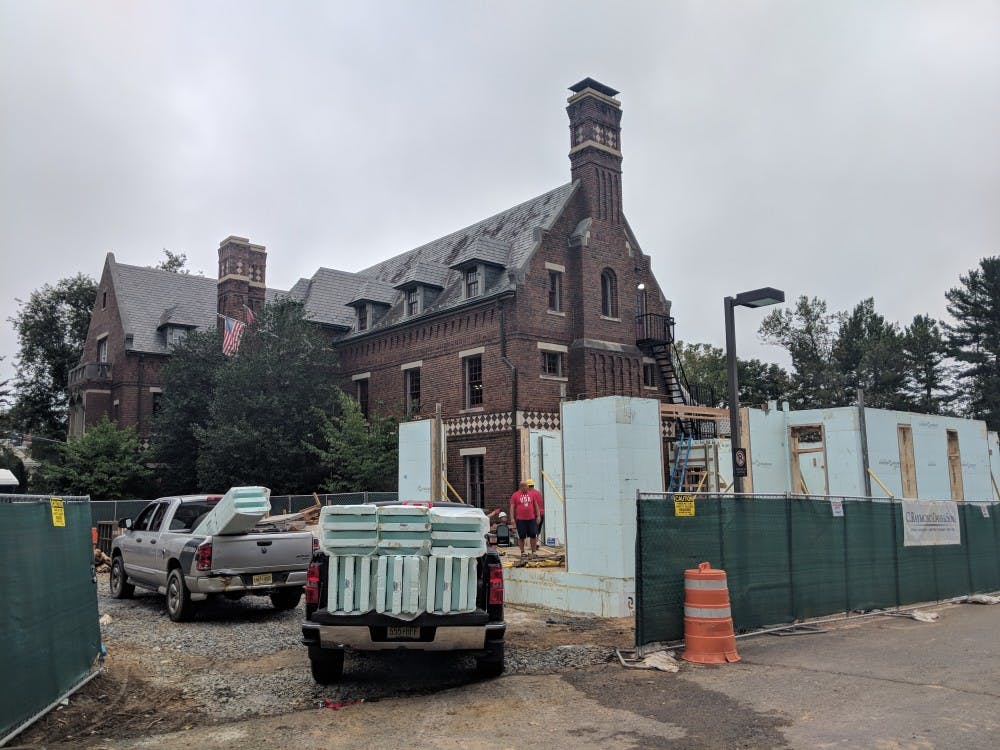The front lawn of Cap & Gown currently sports a crane, a heap of dirt, and a team of construction workers surrounded by a high fence. The eating club is undergoing a historic expansion to open a new wing in time for Reunions this June.
Cap’s alumni board has been working hard to raise the funds for this addition. The new wing will be named the Cox Wing after Howard Cox ’64, who made the most significant contribution. Cap alumna and architect Louisa Bartle Clayton ’93 has been guiding the plans for the renovation, while Michael Farewell, who designed the recent renovation of Cap’s dining hall, serves as the primary architect for the job.
The aboveground feature of the Cox Wing will be the Garden Study Room, which will serve as an additional study space for Cap members. The northern doors of the Garden Study Room will open directly to a new set of benches on Cap’s front lawn.
The room can also be converted into an extra dining and event space for major club celebrations throughout the year. In the past, the club has had to rent tents to accommodate larger events like Reunions and formals. These tents have been very expensive and have harmed the grass in the backyard.
When the club moved to geothermal energy sources in 2011, it was forced to devote more space to energy-related equipment. Since then, the club staff has faced a serious lack of storage space. As a result, the Princeton fire marshal has announced several code violations, mandating that Cap rethink its use of space.
According to RJ Hernandez ’19, Cap’s undergraduate president, the underground aspect of the renovation will enhance the work environment of the club staff. It will provide a staff lounge, in addition to “some added storage space that they sorely need,” Hernandez said.
As a senior, Hernandez will largely miss the opportunity to benefit from the renovation, but he remains enthusiastic about the new possibilities. He is most excited about the Garden Study Room, with its doors leading to the outside.
“I think it’s going to provide a very unique experience and environment for people in Cap, which will be cool,” he explained.

Alumni leaders are excited to expand the building and the space it provides for members.
“The clubs play an important role at Princeton, especially in fostering friendships that may last a lifetime,” Cox said. He added that the clubs also provide a supportive study space.
“Hopefully the new wing will provide additional space that will further members’ academic careers,” he added.
Lisa Schmucki ’74, Cap alumni relations coordinator, also hopes to foster the sense of community she experienced as an undergraduate. Schmucki specifically recalls her experience as one of the first female members of the club.

“I am happy I can serve on the board and continue to help make all students feel welcome at Cap,” Schmucki wrote in an email. She added that she was grateful for the welcoming environment she had found at Cap.
Hernandez also added that the new space will “allow Cap to expand the membership a little bit in terms of numbers.” He said that he recognizes that there are limits to this kind of expansion, since Cap will retain its bicker process and will still have limited student capacity.
Nonetheless, Hernandez said that he believes that Cap will expand membership “little by little, as much as we can,” perhaps by accepting just a few more members every year.








